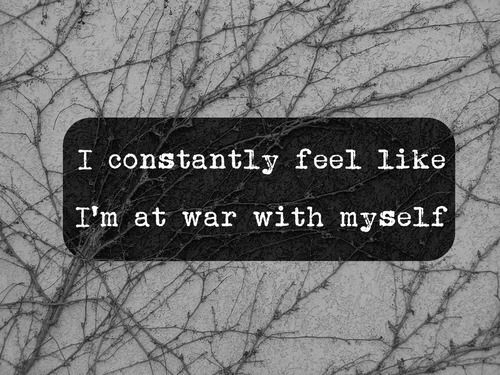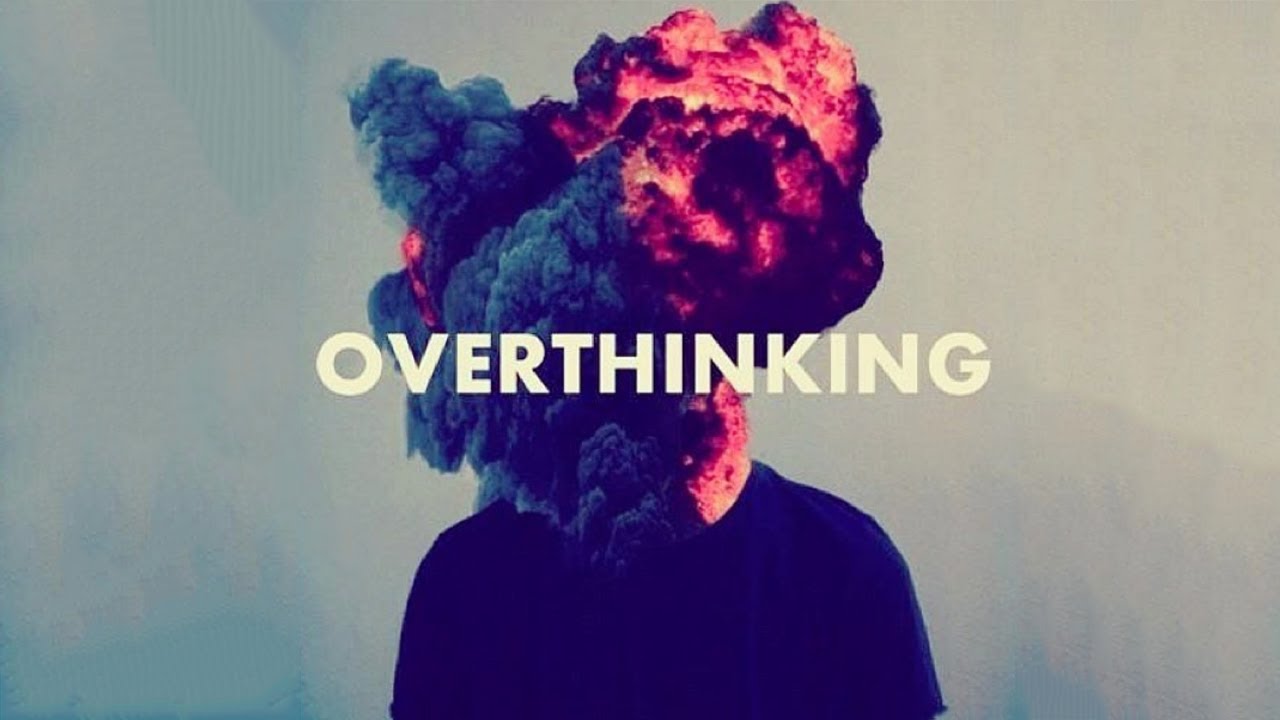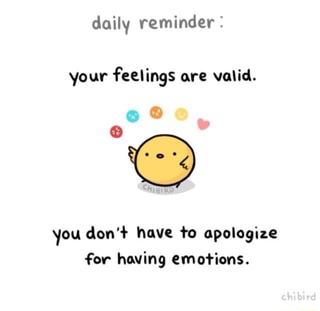
I have a mild form of schizophrenia called schizoaffective. People will sometimes avoid others if you mention having anything linked with schizophrenia it can be scary if someone is misinformed.
May is mental health awareness month and I think more people should know about this disorder. I have Schizoaffective bipolar. At first I thought my bipolar diagnosis was something separate but it’s a part of my schizoaffective disorder.
Schizoaffective disorder is defined from mayoclinic as ”
Schizoaffective disorder is a mental disorder in which a person experiences a combination of schizophrenia symptoms, such as hallucinations or delusions, and mood disorder symptoms, such as depression or mania. The two types of schizoaffective disorder — both of which include some symptoms of schizophrenia — are:
- Bipolar type, which includes episodes of mania and sometimes major depression
- Depressive type, which includes only major depressive episodes
Schizoaffective disorder may run a unique course in each affected person, so it’s not as well-understood or well-defined as other mental health conditions.”
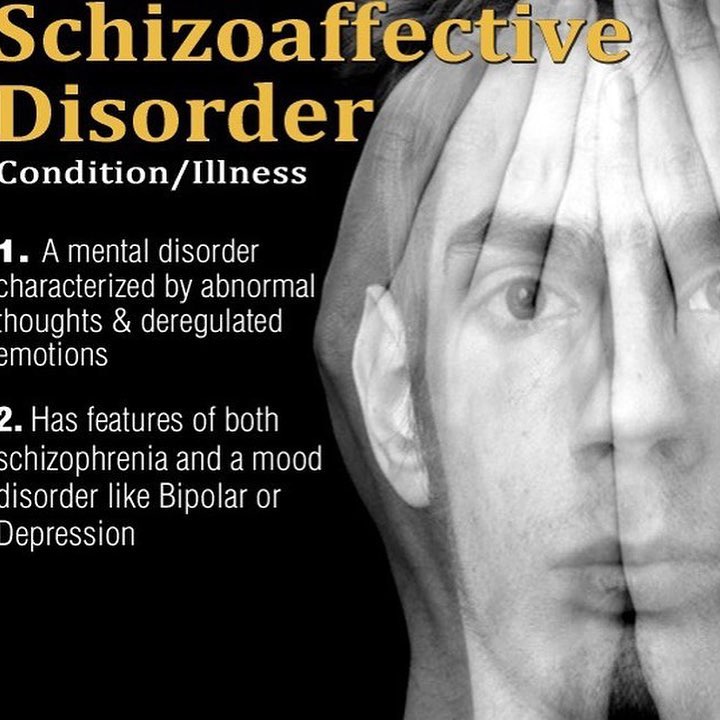
Symptoms include
- Delusions — having false, fixed beliefs, despite evidence to the contrary
- Hallucinations, such as hearing voices or seeing things that aren’t there
(I think people are plotting to kill me, to hurt me, or to harm me in some way. I sometimes think people can read my thoughts, or there are security cameras in my home. I sometimes have very self destructive internal conversations about myself.)
- Symptoms of depression, such as feeling empty, sad or worthless
- Periods of manic mood or a sudden increase in energy with behavior that’s out of character
- Impaired communication, such as only partially answering questions or giving answers that are completely unrelated
- Impaired occupational, academic and social functioning
- Problems with managing personal care, including cleanliness and physical appearance
It also depends on if you’re bipolar or depressive schizoaffective.
The Cause
The cause of schizoaffective can be a combination of different things like genetics or brain chemistry and structure.
Taking psychoactive drugs, having a family member with schizophrenia, or stressful events can cause schizoaffective.
Complications
People with schizoaffective disorder are at an increased risk of:
- Suicide, suicide attempts or suicidal thoughts
- Social isolation
- Family and interpersonal conflicts
- Unemployment
- Anxiety disorders
- Developing alcohol or other substance abuse problems
- Significant health problems
- Poverty and homelessness
Diagnosis
Some ways that someone can get diagnosed is though having a physical exam to rule out any physical illness or health issues, test and screenings to rule out any similar disorders and a psychiatric evaluation by a doctor or professional therapist and it’s very important that you don’t self diagnose.
Treatment
“People with schizoaffective disorder generally respond best to a combination of medications, psychotherapy and life skills training. Treatment varies, depending on the type and severity of symptoms, and whether the disorder is the depressive or bipolar type. In some cases, hospitalization may be needed. Long-term treatment can help to manage the symptoms.”
Medications
In general, doctors prescribe medications for schizoaffective disorder to relieve psychotic symptoms, stabilize mood and treat depression. These medications may include:
- Antipsychotics. The only medication approved by the Food and Drug Administration specifically for the treatment of schizoaffective disorder is the antipsychotic drug paliperidone (Invega). However, doctors may prescribe other antipsychotic drugs to help manage psychotic symptoms such as delusions and hallucinations.
- Mood-stabilizing medications. When the schizoaffective disorder is bipolar type, mood stabilizers can help level out the mania highs and depression lows.
- Antidepressants. When depression is the underlying mood disorder, antidepressants can help manage feelings of sadness, hopelessness, or difficulty with sleep and concentration.
Psychotherapy
In addition to medication, psychotherapy, also called talk therapy, may help. Psychotherapy may include:
- Individual therapy. Psychotherapy may help to normalize thought patterns and reduce symptoms. Building a trusting relationship in therapy can help people with schizoaffective disorder better understand their condition and learn to manage symptoms. Effective sessions focus on real-life plans, problems and relationships.
- Family or group therapy. Treatment can be more effective when people with schizoaffective disorder are able to discuss their real-life problems with others. Supportive group settings can also help decrease social isolation and provide a reality check during periods of psychosis.
Life skills training
Learning social and vocational skills can help reduce isolation and improve quality of life.
- Social skills training. This focuses on improving communication and social interactions and improving the ability to participate in daily activities. New skills and behaviors specific to settings such as the home or workplace can be practiced.
- Vocational rehabilitation and supported employment. This focuses on helping people with schizoaffective disorder prepare for, find and keep jobs.
Hospitalization
During crisis periods or times of severe symptoms, hospitalization may be necessary to ensure safety, proper nutrition, adequate sleep, and basic personal care and cleanliness.
Electroconvulsive therapy
For adults with schizoaffective disorder who do not respond to psychotherapy or medications, electroconvulsive therapy (ECT) may be considered.
Request an Appointment at Mayo Clinic
Coping and support
Schizoaffective disorder requires ongoing treatment and support. People with schizoaffective disorder can benefit from:
- Learning about the disorder. Education about schizoaffective disorder may help the person stick to the treatment plan. Education also can help friends and family understand the disorder and be more compassionate.
- Paying attention to warning signs. Identify things that may trigger symptoms or interfere with carrying out daily activities. Make a plan for what to do if symptoms return. Contact the doctor or therapist if needed to prevent the situation from worsening.
- Joining a support group. Support groups can help make connections with others facing similar challenges. Support groups may also help family and friends cope.
- Asking about social services assistance. These services may be able to help with affordable housing, transportation and daily activities.
Also, avoid drugs, tobacco and alcohol. Drugs, tobacco and alcohol can worsen schizoaffective symptoms or interfere with medications. If necessary, get appropriate treatment for a substance use problem.
Preparing for your appointment
If you think you may have schizoaffective disorder or that your loved one may have it, take steps to prepare for the appointment, whether it’s with a primary care doctor or a mental health professional, such as a psychiatrist.
If the appointment is for a relative or friend, offer to go with him or her. Getting the information firsthand will help you know what you’re facing and how you can help your loved one.
What you can do
To prepare for the appointment, make a list of:
- Any symptoms you’ve noticed, including any that may seem unrelated to the reason for the appointment
- Key personal information, including any major stresses or recent life changes
- All medications, vitamins, over-the-counter medications, herbal preparations and any other supplements, and the doses
- Questions to ask the doctor to help you make the most of your time
Some basic questions to ask include:
- What is likely causing the symptoms?
- Are there any other possible causes?
- How will you determine the diagnosis?
- Is this condition likely temporary or long term?
- What treatments do you recommend?
- What are the alternatives to the primary approach you’re suggesting?
- What are the side effects of the medication you’re prescribing?
- Are there any brochures or other printed material that I can have?
- What websites do you recommend?
Don’t hesitate to ask any other questions during the appointment.
What to expect from your doctor
Your doctor is likely to ask several questions, such as:
- What symptoms have you noticed?
- When did you start noticing symptoms?
- Have symptoms been continuous or occasional?
- Have you thought about or attempted suicide?
- How are you functioning in daily life — are you eating regularly, bathing regularly, going to work, school or social activities?
- Have other family members or friends expressed concern about your behavior?
- Have you been diagnosed with any other medical conditions?
- Has anyone else in your family been diagnosed with or treated for mental illness?
Be ready to answer these questions so you’ll have time to go over any other points you want to focus on.
My experience with Schizoaffective Bipolar
I experience paranoia that someone is going to harm me or that I’m being watched by video cameras inside my apartment. I hear voices saying how useless and worthless I am and that I’m better off dead or that my mom knows she should of have had a abortion with me. I sometimes feel that people can read my thoughts.
This is a sample of what the voices can sound like to me. Listening to this video might trigger you or those around you. Maker sure you’re safe. It’s best listened to with headphones on for full effect. https://www.youtube.com/watch?v=0vvU-Ajwbok
I also experience mania where I feel like I’m on top of the world and can do and achieve anything. I jump from subject to subject or from activity to activity. It’s almost like being on to much caffeine and not being able to control it. After mania is usually a fall on the opposite end where I feel worthless and it’s hard for me to do basic functions like getting out of bed or looking after myself
I survive this with fitness, mindfulness, therapy, and medications.
If you believe someone might be suffering with schizoaffective or any other mental illness please urge them to seek help and let them know they have a support system.
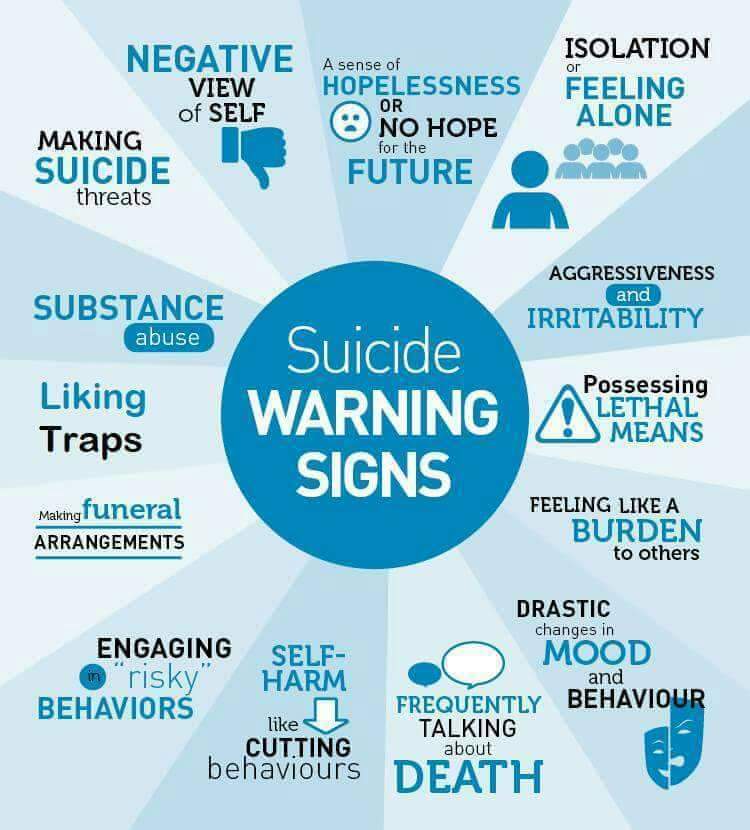
If you or someone you know is suicidal please reach out to them or reach out for help. You can call the suicide prevention hotline at 1-800-273-8255
or text “HOME” to 741741
Sources
https://www.mayoclinic.org/diseases-conditions/schizoaffective-disorder/symptoms-causes/syc-20354504
http://suicidepreventionlifeline.org/ – Suicide Prevention Lifeline
https://www.crisistextline.org/




